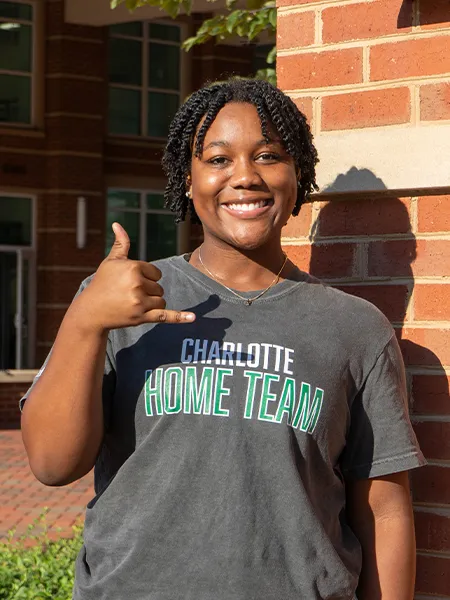
-
Major(s)Exercise Science
Natalya Jones
Why did you choose to be an RA or DA and what has been the most fulfilling part of your experience?
I chose to be an RA because I wanted to ensure that residents had a better experience than I did. That was my first motivation. On top of that, the benefits that came with the role helped me grow as a person. The most fulfilling part of this job is creating lasting relationships with my residents and understanding the importance of a simple hello or asking, “Hi, how are
Are you doing?” It's amazing how that small moment can open the door for residents to feel comfortable with you and trust you enough to talk about what’s going on in their lives. Building those strong connections and seeing them grow as individuals, hearing their success stories, and even the difficult moments, means a lot—especially when they feel safe enough to come to me and share. That’s what makes the job meaningful. Recently, one of the most rewarding things has been seeing my former residents apply to become RAs and go through training with me. It’s a powerful feeling to know I may have played a role in inspiring them to take on this position.
How do you manage your academics, leadership roles, and extracurriculars with your RA or DA job?
The best way for me to manage my academics, leadership roles, and extracurriculars is by using my Google Calendar. It’s accessible on my phone, computer, and iPad, so I can’t avoid it. I make sure to schedule everything in advance and block out time for each responsibility. I believe that setting aside specific time for each task helps ensure everything is evenly distributed. This helps me stay on top of my homework and avoid doing things at the last minute. When it comes to my leadership roles, I prioritize early communication if I think something might conflict with my schedule. For extracurriculars, I make sure not to overbook myself and to fully understand what I’m committing to ahead of time. Clear communication early on is important to staying balanced and successful.
How has the RA or DA role developed you personally and professionally?
I feel that the RA role has helped me grow personally because it has made me more understanding of other people and the different backgrounds they come from. I have also become more observant of how people move and interact. For example, when residents come in through the front door, I have learned to notice who is familiar, who comes in and out regularly, and to pick up on patterns. Recognizing these patterns is important because it helps me catch when something is abnormal and address it before it becomes a bigger issue.
Professionally, this role has taught me to stay organized and manage my responsibilities
effectively. Whether it is keeping up with door decks, bulletin boards, or other RA duties, I have had to outline what needs to get done and when. This has also carried over into my academics, making me more disciplined with my schoolwork. I have found that the organizational skills I have developed as an RA are transferable to any job, and I have already seen them help me in other roles, such as working during the summer.
Another area where I have grown is in maintaining professionalism when it comes to privacy. For example, even when working with children, I learned the importance of protecting their identity and being mindful of safety. While FERPA does not fully apply to my RA job, I have learned to approach situations with the same mindset, such as not disclosing where someone is if asked by an outsider. This has helped me grow professionally and prepared me to handle sensitive information responsibly.
Finally, I think one of the most important lessons has been learning to be personable and approachable. You never know what someone is going through or how a small interaction might impact them. Whether it is offering a smile, having a quick conversation, or just being playful when appropriate, these moments can make a big difference in a resident’s experience and even their overall well-being during school.